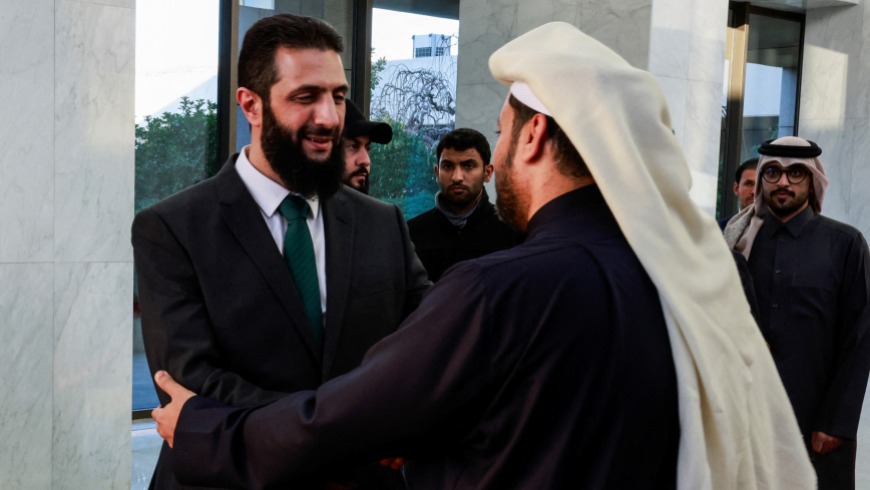In the wake of President Bashar al-Assad’s regime collapse on December 8, Syria is witnessing rapid political and economic shifts, marked by an influx of diplomatic delegations to Damascus. Ahmad al-Sharaa, the commander-in-chief of the new Syrian administration, has engaged with representatives from Jordan, Qatar, Saudi Arabia, and other international stakeholders to discuss pressing issues such as reconstruction, security, economic cooperation, and refugee repatriation.
Qatar’s Strategic Role in Syria’s Reconstruction
Qatar has emerged as a key player in Syria’s transitional phase. In a historic development, a high-level Qatari delegation, led by Minister of State for Foreign Affairs Mohammed Al-Khalifi, arrived in Damascus aboard the first Qatar Airways flight to land in the Syrian capital since the fall of Assad. Sharaa commended Qatar’s steadfast support for the Syrian people since the revolution’s inception and highlighted Qatar’s readiness to invest in key sectors such as energy and ports.
“Qatar has always stood as a partner to the Syrian people, maintaining its unwavering position until the revolution’s victory,” Sharaa stated during a press conference. He emphasized the upcoming “developmental phase” in Syria, which will feature active Qatari participation. Sharaa also disclosed that an official invitation has been extended to Qatar’s Emir, Sheikh Tamim bin Hamad Al Thani, to visit Syria to strengthen bilateral ties further.
Jordan’s Support for Security and Refugee Return
Jordan reaffirmed its commitment to Syria’s reconstruction, prioritizing regional security and the voluntary return of refugees. Foreign Minister Ayman Safadi emphasized the importance of rebuilding Syria as vital for the stability of both Jordan and the broader region. Safadi highlighted Jordan’s readiness to send aid, maintain open borders, and support the drafting of a new Syrian Constitution.
Safadi reiterated that “the security and stability of Syria is integral to Jordan’s own stability” and stressed the need for Arab countries to unite in their support for Syria without external interference.
Saudi Arabia’s Vision and Economic Cooperation
Saudi Arabia also signalled its willingness to engage with Syria’s new administration on several critical issues, including combating Captagon trafficking and fostering economic ties. A Saudi delegation, led by a senior royal court advisor, met with Sharaa to discuss cooperation and Syria’s future trajectory.
Sharaa praised Saudi Arabia’s “bold developmental vision,” highlighting shared goals and the potential for economic and developmental collaboration. He emphasized the importance of dissolving armed factions and ensuring Syria poses no threat to its neighbours.
International and Regional Perspectives
The international community has also weighed in on Syria’s transitional period. The United States reiterated that its troops are no longer needed in Syria, though it remains focused on addressing ISIS-related threats and ensuring Israel’s security. Meanwhile, Iran confirmed the withdrawal of its military advisors from Syria, expressing its support for Syria’s sovereignty and territorial integrity.
The United Nations described Assad’s fall as a critical opportunity to pursue accountability for war crimes. Robert Beattie, head of the Syria Accountability Mechanism, stressed the importance of preserving evidence of atrocities committed under Assad’s regime and called for international coordination to ensure justice.
Towards a Unified Arab Effort
Regional leaders, including Iraqi Prime Minister Mohammed Shia al-Sudani and UAE President Mohammed bin Zayed, called for a unified Arab approach to support Syria during this delicate transitional period. Both leaders emphasized the need for joint coordination to rebuild Syria and restore its stability.
This article was translated and edited by The Syrian Observer. The Syrian Observer has not verified the content of this story. Responsibility for the information and views set out in this article lies entirely with the author.


